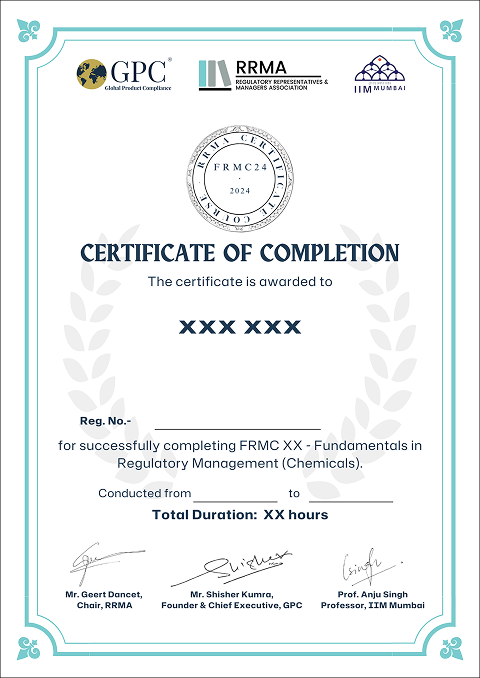Fundamentals in Regulatory Management
A course developed and taught by Regulatory Representatives and Managers Association (RRMA), Global Product Compliance (GPC), and Indian Institute of Management, Mumbai (IIM).

Program Overview
FRMC: Fundamentals in Regulatory Management of Chemicals is a fully digital certificate course designed for individuals who wish to gain in-depth knowledge of product compliance and chemical regulatory requirements across different sectors.
The course is developed and taught by the Regulatory Representatives and Managers Association (RRMA), Global Product Compliance (GPC), and the Indian Institute of Management, Mumbai (IIM Mumbai). The course is delivered by expert practitioners with extensive industrial experience, along with academic faculty specializing in sustainability and compliance.
Key Learning Outcomes
- Quality, Safety & Compliance: Understand global regulations for market success.
- Standards & Conformity: Differentiate between mandatory and voluntary standards.
- Strategic Application: Apply regulatory knowledge to market cases.
- Chemical Regulation & Hazard Management: Learn GHS, hazard classification, and SDS.
- Sustainability Competence: Master sustainability, GRI, and Life Cycle Analysis.
- Regulatory Solutions: Develop strategies for chemical compliance management
- Quality, Safety & Compliance: Understand global regulations for market success.
- Standards & Conformity: Differentiate between mandatory and voluntary standards.
- Strategic Application: Apply regulatory knowledge to market cases.
- Chemical Regulation & Hazard Management: Learn GHS, hazard classification, and SDS.
- Sustainability Competence: Master sustainability, GRI, and Life Cycle Analysis.
- Regulatory Solutions: Develop strategies for chemical compliance management
Course Curriculum
Four comprehensive parts designed to build your expertise progressively
PART A
Module 1 - Introduction to Product Compliance
Module 2 - Compliance Management
PART B
Module 3 - Introduction to Globally Harmonized System and Safety Data Sheets
Module 4 - Classification, Labelling and Packaging of chemicals
PART C
Module 5 - Overview of Regulatory Frameworks in the sectors of interest mentioned below: -
Chemical
Cosmetics
Food Contact Materials
Agrochemicals
Pharmaceuticals
*Additional fee to be paid for opting for multiple sectors of interest
PART D
Module 7 - Sustainable Development Frameworks
Module 8 - Sustainable Supply Chain Management
Capstone Project
To provide a hands-on implementation of the regulations being taught in the FRMC course modules, the applicants are assessed based on the capstone project as well.
With assigned mentors, this makes the capstone project a great learning experience with practical case studies to be included in the report.

Mr. Shisher Kumra
Founder and Chief Executive of GPC Group
Mr. Shisher Kumra is an Environmental Law and Policy expert with 3 decades of experience in the areas of Sustainability management, cleaner production and technology, support chemical policy and regulation, regulatory representation, and setting up compliance management systems. Mr. Kumra as the Founder and Chief Executive of GPC Group has supported global compliance excellence efforts of 1500+ corporations across the world.
Teaching Sections:
Part A

Mr. Anil Jauhri
Former CEO of the National Accreditation Board for Certification Bodies (NABCB)
Mr. Anil Jauhri is the Former CEO of the National Accreditation Board for Certification Bodies (NABCB), Quality Council of India, and currently Lead Assessor at NABCB. He is Co-Chair at RRMA, as well as Chairman at Steering Committee, GCPPCS, CDSA_THSTI. Mr. Jauhri has extensive experience in the regulatory field and was with the Bureau of Indian Standards (BIS), the national standards body, for over 25 years, having key roles and positions in the organization. Mr. Jauhri also worked as Adviser in the Export Inspection Council, India’s export regulator and certifying agency under Department of Commerce (2000-2003).
Teaching Sections:
Part A

Mr. Karthik Nilagiri
Lead Compliance Officer in Reliance Industries Limited.
Mr. Karthik Nilagiri is a Lead Compliance Officer in Reliance Industries Limited. He ensures unhindered global market access and petrochemical products of Reliance Group. He leads compliance of Chemical Regulations such as EU-REACH, UK-REACH, Turkey-KKDIK, Korea-AREC and Indian CMSR. He further handles Anti-Trust (Competition Law) compliance for petrochemical products and also assists Trade Remedy Measures such as Anti-Dumping, Anti-Subsidy and Safeguard Duties. Mr. Nilagiri is an Instrumentation Engineer with around 23 years of experience in Hydrocarbon, covering Regulatory, Manufacturing, Retail and Corporate Affairs. He has done Management in Indian Institute of Management, Bangalore (IIM-B), Economics from Bharathidasan University, Tiruchirappalli and completed two courses on Competition Law from Ministry of Corporate Affairs, New Delhi.
Teaching Sections:
Part A

Mr. Sorosh Ziarat
Regulatory Coordinator at GPC
Mr. Sorosh Ziarati is a Regulatory Coordinator at Global Product Compliance (GPC). He primarily works on the North American regulatory market and GHS, as well as on pharmaceutical regulations such as ICH and FDA. He holds a M.Sc. in Pharmaceutical Technology from Lund University.
Teaching Sections:
Part B

Ms. Anju Gurjar
Esteemed Manager in Technical Department at Global Product Compliance (GPC)
Ms. Anju Gurjar is the esteemed Manager in Technical Department at Global Product Compliance (GPC). She has 9+ years of experience in global chemical regulatory affairs. At GPC, she is mostly associated in managing the team in different sectors mainly lead registrant (LR) dossier, technical dossier submissions to ECHA, C&L notification, PCN and SCIP dossiers, preparation of Chemical Safety Reports (CSR). Anju Gurjar is also experienced in SDS, e-SDS, other regulatory projects and EU-REACH & REACH like regulations such as KKIDK, Korea REACH etc.
Teaching Sections:
Part B

Mr. Fabien Henry
Manager of Regulatory Affairs at the South-East Asia Nickel Institute
Mr. Fabien Henry is the Manager of Regulatory Affairs at the South-East Asia Nickel Institute. In this position, he is is responsible for ensuring that developing regulations for nickel and nickel compounds in South-East Asia are based on sound science and risk management. He represents the nickel sector with supra-governmental organizations in the region, national authorities and industry associations. He is based in Singapore. Prior to joining the Nickel Institute in 2018, Fabien worked for 8 years as Regulatory Affairs and Business Consultant. He gained extensive experience on regulatory monitoring and support for corporate clients, working on GHS, chemical management, and other regulatory topics.
Teaching Sections:
Guest Session

Dr. Vaibhav Diwan
General Manager (Growth) at GPC
Dr. Vaibhav Diwan is a leading professional in the global chemical regulatory space. He is an expert in establishing regulatory compliance as an opportunity for business growth in the chemicals sector and related sectors. As General Manager (Growth) at GPC, he works with the senior management of multinational companies, helping them grow across the global market space by strategically addressing compliance challenges. He holds a Ph.D in Life Science (Molecular Biology and Microbiology).
Teaching Sections:
Part C

Dr. Manisha Karale
Program Manager at the RRMA.
Dr. Manisha Karale is a Program Manager at the Regulatory Representative Managers Association (RRMA). She manages regulatory research activities, regulatory research internship and apprenticeship, industry-academic collaborations, writing review articles, and research grant proposals. She is involved in the development and management of certificate courses for students and regulatory professionals. She mainly works on regulatory affairs in various sectors, including chemical compliance, food contact materials, cosmetics, sustainability, etc. She contributes to content development for the regulatory intelligence portal and regulatory reports for clients’ queries. She holds a master’s in Biochemistry and a Ph.D. in Environmental Science.
Teaching Sections:
Part C

Dr. Derya Ercikan
Secretary General and Board Member of the Turkish Chemical Manufacturers Association (TKSD; member of CEFIC).
Dr. Derya Ercikan is the Secretary General and Board Member of the Turkish Chemical Manufacturers Association (TKSD; member of CEFIC). He is further a Member at the Sustainability Committee of Composites Manufacturer’s Association. He has 36+ years of experience with 6 years as an academician, and 30 years in the private sector in QC, QA, R&D, Innovation, Sustainability and Regulatory. Dr. Ercikan holds a M.Sc. in Environmental Engineering from University of Leeds, UK, and a Ph.D in Chemical Engineering from Istanbul Technical University. He has worked in Executive and Working Groups, as well as EU Consortiums of 6 sector groups under CEFIC. He is further a Member of the Chemical Sector Group of TOBB, a Moderator of the private chemical sector for Green Transition Working Group, and has been working and attending to most of the meetings for EU REACH since 2002.
Teaching Sections:
Guest Session

Mr. Piyush Mohapatra
GSr. Program Coordinator and the Head of theChemical Safety and Health Program at Toxics Link.
Mr. Piyush Mohapatra is the Sr. Program Coordinator and the Head of the Chemical Safety and Health Program at Toxics Link. He has a post-graduate inEnvironmental Toxicology and Law and is associated with Toxics Link for morethan fifteen years. He has published many reports on issues related to the Persistent OrganicPollutants Endocrine disrupting chemicals, Mercury etc.
Teaching Sections:
Part D

Dr. Anju Singh
Professor at IIM (Indian Institute of Management) Mumbai and at IIT (Indian Institute of Technology)
Dr. Anju Singh is a professor at IIM (Indian Institute of Management) Mumbai and at IIT (Indian Institute of Technology) Bombay. She has 24+ years of experience in teaching and researching on Sustainability, Environmental Management and CSR, and has published and presented 225+ research papers. She won various awards in different categories of research, and worked as a consultant to CII to Sustainability Awards, as well as a rewiewer and editor of several journals. She holds a Ph.D. in Environmental Science and Engineering.
Teaching Sections:
Part D
Quick Facts
Course Fees
*Add-on Fee for Additional Sectors
|
Non RRMA Member,
|
₹14,750 |
|
RRMA Member,
Medium and Large Company : Groups of up to 50 People (RRMA Members),
|
₹11,800 |
|
Micro and Small Size Company,
Medium and large companies: Groups of people 50 or more,
IIM Mumbai Alumni,
NGO,
Student,
Government Employee,
|
₹8,030 |
Who Is It For?
-
This course is ideal for professionals and students who want to deepen their understanding of product compliance and chemical regulations.
- Regulatory Affairs Managers
- Compliance Officers
- Product Safety Managers
- Environmental Health and Safety (EHS) Managers
- Supply Chain Professionals
- Students in Science or Chemical Engineering

Eligibility criteria
This course is open to working professionals and undergraduate/postgraduate students who have an academic or professional background in Chemical Sciences, Pharmaceutical Sciences, Agrochemicals, Food Safety/Technology, or Toxicology.
The course is also suitable for individuals who wish to explore and build a foundational understanding of regulatory management, regardless of prior industry experience, provided they have an interest in regulatory affairs and compliance.
Why Choose This Program?
Experienced Instructors
Learn from industry experts with practical experience.

Complete Coverage
Understand key regulatory topics for better compliance.

Flexible Learning
Study at your convenience, at your own pace.
Career Growth
Boost your career with a recognized certification.
Certification Process
Enrollment & Learning
Start the course instantly with full access to all materials. Learn at your own pace with pre-recorded sessions, quizzes, and interactive resources.
Assessment
The assessment will include multiple-choice quizzes and assignments to evaluate your understanding of the course material and its practical applications.
Certification
Receive your official RRMA,GPC & IIM Mumbai certification
View CertificateCourse Brochure
Get the full course overview, including detailed curriculum information and everything you need to know about certification options. Download it now to explore all the exciting opportunities that await you!
DownloadWhat They Say
Video testimonials
Frequently Asked Questions
Ready to Advance Your Career?
Join 100+ professionals who have earned their certification and transformed their careers in chemical regulatory affairs. Start your journey today and become a certified regulatory professional.
Enroll Now
Questions About This Program?
Our enrollment advisors are here to help you make the right decision for your career





.png)
.jpg)








